- Home
- Peter Straub
Julia
Julia Read online
Peter Straub
Julia
1975
For Thomas and Alice Tessier
So a war begins. Into a peace-time life, comes an announcement, a threat. A bomb drops somewhere, potential traitors are whisked off quietly to prison. And for some time, days, months, a year perhaps, life has a peace-time quality. But when a war has been going on for a long time, life is all war, every event has the quality of war, nothing of peace remains. Events and the life in which they are embedded have the same quality. But since it is not possible that events are not part of the life they occur in—it is not possible that a bomb should explode into a texture of life foreign to it—all that means is that one has not understood, one has not been watching.
—DORIS LESSING, The Four-Gated City
Part One
The Haunting: Julia
1
The little blond girl, about nine or ten—Kate’s age—and enough like Kate to make Julia feel dizzy, ran floating up from nowhere along Ilchester Place and, windmilling her arms at the street corner, flew into the path to Holland Park. Standing on the steps of the house with the man from Markham and Reeves, Julia’s first sensation was the sharp, familiar ache of loss, now so strong as to make her feel that she might shock the man from Markham and Reeves by being sick into the wilting tulips; but the real-estate agent, who had clearly decided that his customer was precipitous and eccentric to the point of lunacy, might have done no more than mutter something about the heat and pretend that nothing out of the ordinary had occurred. That Julia had already twice lost the keys to Number 25, that she had written a deposit check for twenty thousand pounds on the first day she had seen the house (the first house he had shown her), that she was buying, as well, all the furniture from the previous owners, a retired carpet manufacturer and his wife already in Barbados, that she intended to live alone in an eight-bedroom house—but he had his own ideas on that point—had prepared him for almost any conceivable vagary on her part. Conscious of her haste and her oddness, and a little fearful of the man’s subtle contempt for her, Julia yet felt it possible that the estate agent attributed some of this behavior to her being merely another comically “rich American”; and so she felt, with a little flare of independence, only the smallest qualm about obeying her second response to the sight of the running blond girl, a feeling that she must follow her. The impulse was overwhelmingly strong. The man from Mark-ham and Reeves was holding her by the elbow, very delicately, and beginning to produce the third key from his waistcoat pocket—he had tied a bright yellow ribbon through the hole at the top of the key.
“Yellow for remembrance, Mrs. Lofting,” he was saying, the edge of condescension clear in his voice. “Confess I pinched the idea from a pop song. May you—”
“Excuse me,” Julia said, and went quickly down the steps to the pavement.
She did not want to run until she was out of the man’s sight, and restrained herself until she too had rounded the corner to the park and was shielded by the wall. The girl looked remarkably like Kate. Of course she could not be Kate. Kate was dead. But people sometimes caught sight of friends in a crowd or riding past in a bus when those friends were in reality thousands of miles away—but didn’t that mean that the friends were in danger or about to die? Julia ran a few awkward steps into the children’s play area and, already panting, began to walk. Children were everywhere, in the sandboxes, racing around on the patchy grass, climbing the trees she could see from her bedroom window. The blond girl could be far into the park by now, Julia realized, either on the long sward of green to the right or on one of the paths up ahead, or over toward the Orangery. The child might not even have taken the path into the play area but run straight up the long lane to Holland House. Surely Holland House was that way? Up there past the peacocks? Julia did not feel sure enough of the park’s geography to pursue her phantom—who in any case was just an ordinary little girl on her way to meet friends in Holland Park. Julia, who was still unthinkingly walking up the path past the sandboxes, stopped. Chasing after the child had been unreasonable, perhaps hysterical: typical of her. I really am losing my grip, she thought, and said “Damn” so loudly that a stout man with a brushy gingery mustache stared at her.
She turned about, embarrassed, and looked up across the back walls of gardens to the upper row of windows in her new house. The house was monstrously expensive: she could not allow Magnus to know that she had purchased it, that she had signed every paper put in front of her. For a moment the thought of Magnus—the idea of Magnus, enormous with rage—drove everything else from her head, and she felt a second of terror. She might have been unreasonable, even unbalanced—he would be quick to say it—but about Magnus, reason was not possible. The long, restrained lines of the house, which she had thought beautiful the moment she had seen it, helped her to quiet her feelings.
Holding one hand to her chest, Julia walked back down the path to the corner of Ilchester Place. She remembered the man from Markham and Reeves only when she saw him leaning against the front door, his expression one between confusion and boredom. He had written her off when, telephoning her bank from his office, he had learned how much money she kept in a checking account.
She expected the man to say something, but he appeared to be past courteous formulas. He merely straightened his shoulders and offered the key, holding it by the flagrant yellow ribbon. Now he did not look so much bored as weary. And in any case, what could Julia say? She could not explain her sudden action by telling him that she had wanted to look again at a girl who reminded her of her dead daughter: he did not know anything about Kate or about Julia. She did the best she could.
“I’m so sorry,” she said, looking up into his gray, rather compressed-looking face. “I wanted to check on something around the back before you left.”
He looked at her oddly: to examine the back, of course, she would have gone through the house rather than around the corner.
“Not a lot of children on this street, Mrs. Lofting,” the man said. “They play in the park of course but you’ll find that Ilchester Place is a quiet sort of neighborhood, as I’ve told you.” Was this, too, more tired sarcasm? But the man had noticed the girl, and was making an effort to be courteous. He had looked straight through her weak excuse,
“Thank you,” she said, taking the key and putting it in one of the short pockets of her dress. “You’ve been very patient with me.”
“Not at all.” The man looked at his wristwatch, then for a moment at his car, and then at the Rover, where suitcases were piled up on the backseat, crowded in with some potted plants, two short stacks of books tied with string, and a box of floppy dolls she had, had since childhood. These were the only things she had taken besides her clothing, and they were all from the room she had been using since leaving the hospital. The books were an indulgence, but they were hers, not Magnus’.
“No, you needn’t, please,” Julia quickly said. “I couldn’t dream of asking you, after …everything.”
“In that case,” he said, palpably relieved, and began to go down the steps, “I have some things to attend to at the office, so if you’ll excuse me, I’ll be leaving you to your new house.” He glanced up at the long, warm brick exterior. “It is a beautiful house. You should be quite happy here. And of course you have our number, should anything arise. Am I correct in thinking that you do not know Kensington thoroughly?”
She nodded.
“Then you have before you all the pleasures of investigation. Where was it you were living before? Before today? Hampstead, wasn’t it?”
“Yes.”
“You should JSnd this part of Kensington very sympathetic.”
He turned away to walk toward his car. When he had opened the door he faced her again and called across the pavement and lawn. “Do rin
g us if you have any problems, Mrs. Lofting. By the by, I think you might have some spare keys made for you at one of the shops in the High Street. Well, good day then, Mrs. Lofting.”
“Bye.” She waved from the steps of the house as the man drove away. When his car was out of sight, Julia went down to the Rover and looked back up at her house—now truly her house. Like all the other houses on the short, elegant length of Hchester Place, it was neo-Georgian, brick, secure. There she would be safe from Magnus. The house had spoken to her need for quiet and for restful seclusion the moment she had seen it: almost as if it had in fact spoken to her. Buying it had been as much a compulsion as following the little Kate-like girl had been. She could live in it, apart from Magnus: in time she could telephone him or write a note, after he had got used to the idea of her bolting. She had spent the previous night in a Knightsbridge hotel, afraid that every step meant the approach of Magnus, his face red with false sympathy, with the effort of trying to contain his violence. Magnus -could be terrifying: it was the other side of his impressiveness, that huge male authority. No, she would let Magnus be for a while. Her note had explained all that could be explained.
Now the suitcases and the rest of her things had to be got into the house somehow. She pushed the button beside the door handle and, when it resisted her, pushed it again harder. The car was locked. Julia pulled a key from her pocket, but it was the house key on its taunting yellow ribbon. She bent over to look through the window and saw the rest of her keys dangling from the car’s ignition. Helpless. She felt the oncoming of tears. For a moment she experienced an intense gratitude that Magnus was not beside her. “Julia, you are completely incapable.” “I wonder if you ever do anything right.” Or a short, brutal condemnation: “Typical.” A barrister, Magnus had an arsenal of techniques for suggesting that other people, especially his wife, were weak in the head.
“Oh, thank God,” she said aloud; she had noticed that the window on the passenger side of the Rover was rolled down, although that door too was locked. “Typical” as that might be, Julia took it as a good omen for the first day she was to live in her new house. Perhaps Magnus really might be kept from finding her—for a week or two, at least.
As if the two were related, the thought of Magnus recalled the girl again, and Julia, opening the other door by reaching in through the window and pressing down on the inner handle, thought of trying to find her inside Holland Park. She fought down the image of herself and the girl, sitting together on a bench, talking. Beneath this lay another image, an image of horror and despair, and Julia, sensing it coming to her consciousness as it had during the weeks in hospital, deliberately made her mind empty. She would think about the luggage and the plants; one of the pots had broken, shearing away a section of clay nearly seven inches long and exposing granular black soil webbed with thin white roots. Julia had, she realized, bought the house on Ilchester Place the same way she had taken Magnus for her husband, in a rush.
But she had spent her money on her house: it was the first utterly free thing she had done since she had married Magnus eleven years before. Then, in 1963, she had been twenty-five, a rather more than pretty young woman with striking reddish hair and a soft, unlined, contented face: “the face of a girl at an Impressionists9 picnic,” her father had said. She had gone through her private school and Smith College, it seemed to her now, in a sort of trance, at a great distance from herself. Little but her courses and a few professors had moved or touched her. She had lost her virginity to a boy from Columbia, a tall, intense Jewish student of English. Most of his courtship had consisted of anecdotes about Lionel Trilling and the sex lives of famous poets; they had seen a great many French movies together.
Afterward there were other boys, but none of them came any closer to the inner Julia than the Columbia student; she slept with none of them.
When she graduated from Smith, she took a job with Time-Life, in the clipping library at Sports Illustrated, but quit a year later when she overheard another young woman, one she had thought of as a friend, describe her as a “fucking heiress.” Quitting was a relief: she knew that she was incompetent at the job, and had lasted a year because the head of her department, a married man named Robert Tilling-hast, was fond of her. She liked him, but not enough to remove her clothes in his company, which was clearly what he had in mind. For six months, then, she lived in her parents’ home, reading novels and watching television, feeling more and more afraid of any world beyond the front door or the Smith campus; then she ran into a Smith friend in a restaurant and heard that the publishing company she worked for was looking for a young woman to do editorial work; in a week she had another job. Here, she enjoyed an almost mechanical, rootless pleasure in the work, editing academic books in the firm’s college department; she was fond of saying that she learned things from each new book. She took an apartment in the West Seventies. She seemed to be settling into a dazed, busy, thoughtless life: taking the bus to work (on principle, she rarely rode in taxis), doing her correspondence, working with manuscripts, eating with one man or another, she often thought that she was merely watching herself perform, as though life had not yet truly begun. Then one morning she woke up in her bed beside Robert Tillinghast, and decided, panicked, to leave New York and go to England. “I’m moving horizontally since I’m not able to move vertically,” she told her friends. Robert Tillinghast drove her to the airport and said, Good God, he wondered what would become of her. “I guess I do too.”
In London, she first took a room on Drury Lane, and six months later, after she had found a job with a publisher of art books, moved to a two-room flat in Camden Town. “You’re living in a kennel,” her father had blustered when he flew across to inspect her new life. “Where the hell are the want ads?” He found her a self-contained, large-windowed flat with two bedrooms (“You need a room to work in!”) in Hampstead, three times the cost of her place in Camden Town. One night several months after she had moved in, she met Magnus Lofting at a party given by a married couple who both worked for the art-book publishers.
They were Hugh and Sonia Mitchell-Mitchie, both Julia’s age; Hugh, who wore denims and T-shirts and the golden curl of an earring in one ear, was the head of the art department. Sonia, like Julia, did editorial work. In manner, both were bright and inconsequential; Julia, who liked them while she was a little unsettled by them—both seemed to spend an abnormal amount of time discussing their love affairs—had not known that their idea of a party was to spend two hours drinking as rapidly as possible and the rest of the night playing parlor games.
When the others began to play, Julia faded backward in the room, hoping to go unnoticed: she was made insecure by all games. Sonia began to taunt her; in a moment, twenty people were staring at her. Julia felt cruelly exposed.
“Don’t be a bully, Sonia,” a man said. “I’ll talk to your friend.”
Julia turned to the source of this authoritative voice, and saw a big rocky-faced man in a pinstriped suit; he was years older than anyone else at the party. The hair above his ears was already going gray. “Sit down next to me,” the man ordered.
“You saved my life,” she said.
“Just sit down,” Magnus ordered.
She gladly sat.
Ten years later, she could not remember the conversation they had had, but she knew that, immediately, there had been something impressive about him: he was purely male, with a suggestion in every gesture that he could take her as easily as he could light a cigarette. With the instincts of someone who had grown up surrounded by prosperous people, she recognized that he was successful at whatever it was he did; he seemed to understand her utterly, or to be utterly indifferent to anything he did not understand. In a chilling way, he was fascinating. They spent the rest of the evening talking to one another, and while Hugh and Sonia and the rest of the party were beginning another game, one in which a “murderer” assassinated his “victims” by winking at them, Magnus said quietly to her, “I think I’ll be going. Shall I giv
e you a lift? How did you get here?”
“I took a bus,” she confessed.
“Too late for a bus now.” He stood up. He was a head taller than she and too big to be merely burly. When he raised a hand, she flinched; but he carried it to the back of his head and smoothed down his hair. “I’ll take you home unless you live somewhere unreasonable. Blackheath or Guildford are out of my range.”
“I live in Hampstead,” she said.
“Grace abounds. So do I.”
They walked to his car, a black Mercedes, parked on the Fulham Road; she learned that he was a barrister, and that he had once lived next door to Sonia Mitchell-Mitchie, who had become a kind of adopted niece. He asked few questions of her, but Julia found herself talking compulsively. For some reason—a reason she was not to understand for years—she even mentioned Robert Tillinghast when describing why she had left New York.
It was only when she knew that she was going to leave Magnus that she recognized that she had married him—had fallen in love with him—in large measure because he reminded her of her father. And they were both prodigal, casual adulterers. Julia saw very early that Magnus had other women: he was brutally offhand about them. On the ride back to Hampstead, he had said that he wanted a drink, and drove to a club behind Shepherd’s Market, where he signed her name in a guestbook and led her into a dark, half-filled room in which elegance was still a few paces in advance of shabbiness. The waitresses wore long pastel gowns revealing out-size, separated breasts. A third of the men were drunk; only two women, besides Julia and the hostesses, were in the club. One of the drunks put his arm about Julia as soon as she entered the room. Magnus pushed the man away without looking at him. He ordered drinks and began to look aggressively about the room as if he were looking for another man to knock down. Both of the other women, Julia saw, were looking at him. She felt pleasantly excited, stimulated, sipping at her drink.

 Poe's Children: The New Horror: An Anthology
Poe's Children: The New Horror: An Anthology Koko
Koko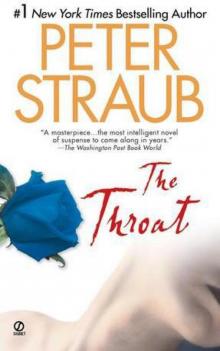 The Throat
The Throat Julia
Julia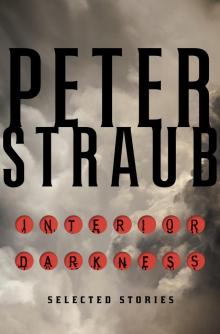 Interior Darkness: Selected Stories
Interior Darkness: Selected Stories A Dark Matter
A Dark Matter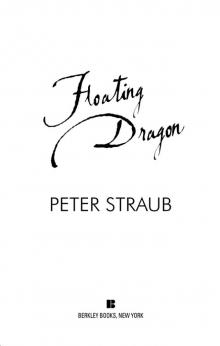 Floating Dragon
Floating Dragon Houses Without Doors
Houses Without Doors Mr. X
Mr. X Ghost Story
Ghost Story Mystery
Mystery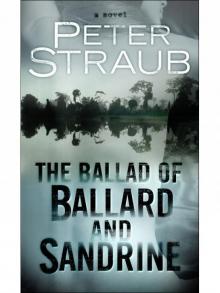 The Ballad of Ballard and Sandrine
The Ballad of Ballard and Sandrine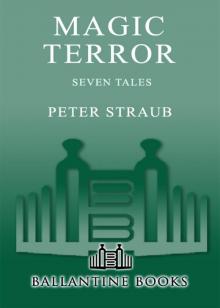 Magic Terror
Magic Terror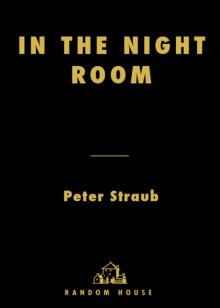 In the Night Room
In the Night Room Lost Boy Lost Girl
Lost Boy Lost Girl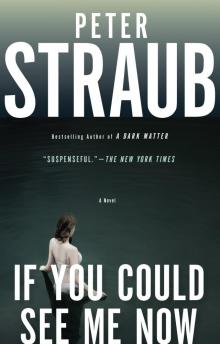 If You Could See Me Now
If You Could See Me Now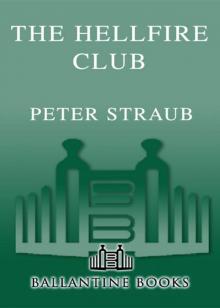 The Hellfire Club
The Hellfire Club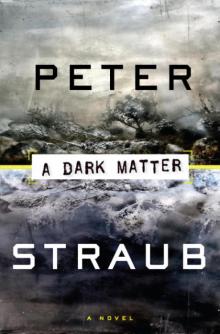 A Dark Matter: A Novel
A Dark Matter: A Novel Koko brt-1
Koko brt-1 Shadowland
Shadowland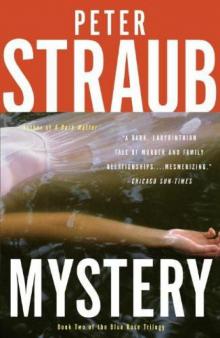 Mystery brt-2
Mystery brt-2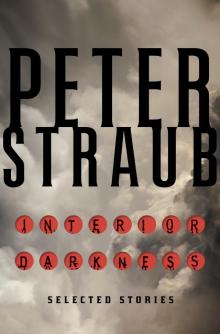 Interior Darkness
Interior Darkness Poe's Children
Poe's Children